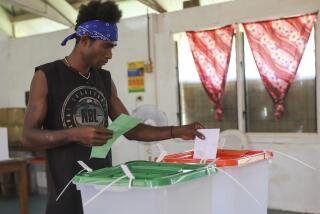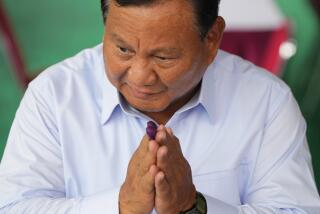Militia Warfare Threatens Vote in East Timor : Asia: Indonesian province will choose between independence and autonomy. Many fear civil war will break out.
- Share via
DILI, Indonesia — After more than 23 years of tough Indonesian rule, the terrorized people of East Timor will go to the polls Monday to decide whether their impoverished province should become an independent nation or remain part of Indonesia.
Most political analysts believe that East Timor, a former Portuguese colony invaded by Indonesia in 1975 and annexed the next year despite international condemnation, will vote overwhelmingly in the United Nations-supervised plebiscite to become independent.
But there are no guarantees that the militias representing the two opposing camps--those favoring independence and those who want continued association with Indonesia--will respect the voters’ decision, raising the possibility that East Timor could be engulfed once again by civil war.
The warring militias backed away from confrontation early today, saying in a news conference that their forces would be told not to carry weapons outside designated areas, thus allowing the vote to proceed peacefully.
But the announcement was met with skepticism because similar pledges in the past have not been honored.
“If East Timor becomes independent, it will become a sea of fire,” Eurico Guterres, the leader of one anti-independence militia, said before the agreement was announced.
With U.N. Secretary-General Kofi Annan having expressed dismay at the violence that has led up to the election, the Indonesian military has put warships and airplanes on standby in case an evacuation of Timorese civilians and foreigners is necessary. A sense of fear already grips virtually every town and village.
Already, about 1,000 people have been killed since President B. J. Habibie reversed Indonesian policy in January and offered East Timor either independence or association with Indonesia with great autonomy, including its own flag and parliament. About 80,000 people have been uprooted from their homes, the U.N. says.
“People are very afraid of the militias,” said Sister Esmeralda of the Canossian Sisters Convent in this shabby seaside capital. About 500 people have taken refuge there.
“I just hope we can have a peaceful election,” she said. “If we lose this opportunity, we may not get any others.”
Leaders of the opposing militias met twice with U.N. and Indonesian officials in Jakarta, the Indonesian capital, this month and agreed to set up a 25-member Consultative Council to plan East Timor’s postelection future.
A U.N. official who attended the meetings said that “there is a disconnect between the militia leaders and local commanders on the ground. The militias don’t have a real command structure, and local commanders do pretty much want they want.”
Indeed, unruly bands of militia thugs, often armed with swords, spears and machetes, have terrorized neighborhoods and villages during the past month, hunting down and killing opponents, intimidating potential voters and threatening U.N. workers and journalists. On Thursday, one pro-independence militia ran amok in Dili, killing at least five people and wounding many more.
“Half a dozen militia people came into my house at midnight last night,” Joao de Araujo, 50, an unemployed carpenter, said Saturday. “They shot into the ceiling and said they would come back and kill me if I voted for autonomy.”
In addition to 600 unarmed U.N. police officers, pre- and postelection security is meant to be provided by 8,000 Indonesian police. But they are regarded by most here as incompetent, untrained and afraid of the militias. Indonesia also has 18,000 soldiers in East Timor, but they have made no attempt to protect the innocent.
Although Indonesia’s defense chief, Gen. Wiranto, has pledged that his soldiers will be neutral, the military has armed and advised anti-independence militias and is widely viewed as supporting Habibie’s autonomy offer.
Part of the reason is that the Indonesian army lost more than 10,000 soldiers in 24 years of sporadic warfare here, and commanders think that giving East Timor independence would sully the soldiers’ honor and diminish their sacrifice. Some commanders also amassed large fortunes by controlling the local coffee industry until 1995.
Indonesia has been criticized throughout the world for its failure to curb preelection violence, and there have been suggestions that, if the elections are derailed by militia violence, international aid could be affected.
Scattered violence continued throughout the province Saturday, but Dili was mostly quiet.
While the rest of Indonesia was a Dutch colony and is largely Muslim, East Timor was run by Portugal and is Roman Catholic. The overthrow of Lisbon’s right-wing dictatorship in 1974 led to East Timor’s sudden decolonization. In short order, the former colony was engulfed in a civil war that seemed likely to bring the Revolutionary Front for an Independent East Timor, a Marxist party, to power.
On Dec. 7, 1975, Indonesia’s anti-Communist president, Suharto, fearing that another Cuba was being born on his doorstep, sent his troops into Dili. As many as 200,000 Timorese--or one in four of the population--have since died as a result of warfare and starvation during Indonesia’s often brutal rule.
It was not until 1996, when two East Timorese, Jose Ramos-Horta and the Catholic bishop of Dili, Carlos Ximenes Belo, shared the Nobel Peace Prize that the world started paying much attention to East Timor. And until Habibie’s surprise offer in January, Indonesia had insisted it would never surrender the province.
If the Timorese vote for independence Monday--results of the election won’t be announced by the U.N. for a week or more--Indonesia’s People’s Consultative Assembly, or parliament, will have to approve the change when it meets in October or November. The U.N. would then be likely to administer East Timor for a transition period of two or three years.
As an independent nation, East Timor would be among the world’s poorest countries. Besides its coffee, much of which is bought by Starbucks Corp., it produces little except 20,000 barrels of oil a day, which it splits with Australia. Per capita income is under $300 a year.
(BEGIN TEXT OF INFOBOX / INFOGRAPHIC)
Contention and Bloodshed
Background: Indonesia invaded the former Portuguese colony of East Timor in 1975, triggering years of guerrilla warfare and human rights abuses.
The vote: The plebiscite Monday will give residents of mostly Christian East Timor a choice between staying part of Muslim Indonesia as an autonomous region or becoming fully independent.
The violence: Pro-Jakarata militias backed by Indonesian armed forces have clashed with pro-independence groups in recent days. Several people have been killed.
More to Read
Sign up for Essential California
The most important California stories and recommendations in your inbox every morning.
You may occasionally receive promotional content from the Los Angeles Times.












